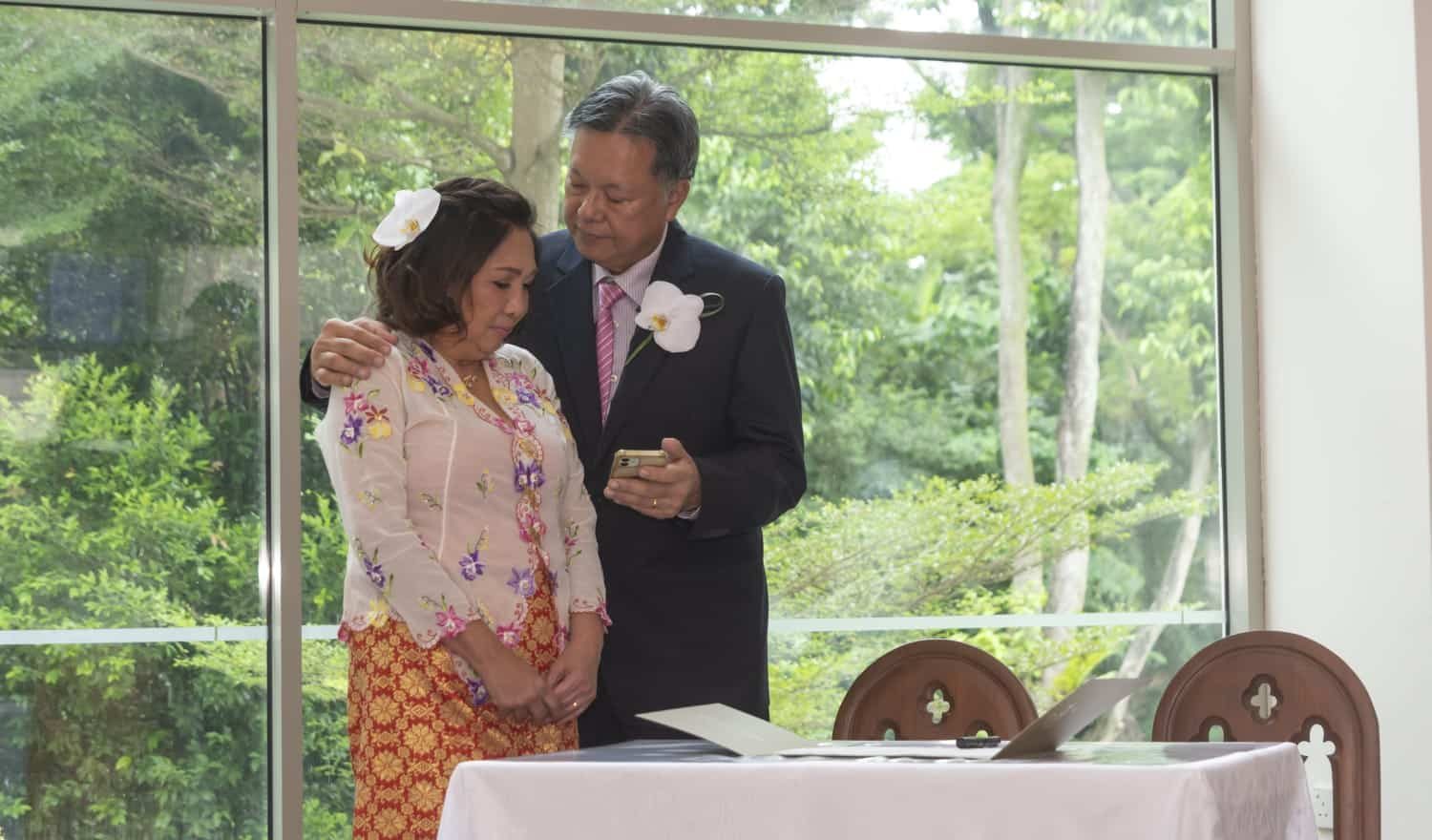“Do you know this is a forsaken place?”: How Pastor Caleb’s heart broke for the drug addicts, ex-offenders and mentally ill in Chinatown
Angels, God's messengers of truth and light, still walk amongst us today. This Christmas, Salt&Light brings you the moving stories of five "Angels in our Midst".
by Juleen Shaw // December 24, 2019, 4:44 pm
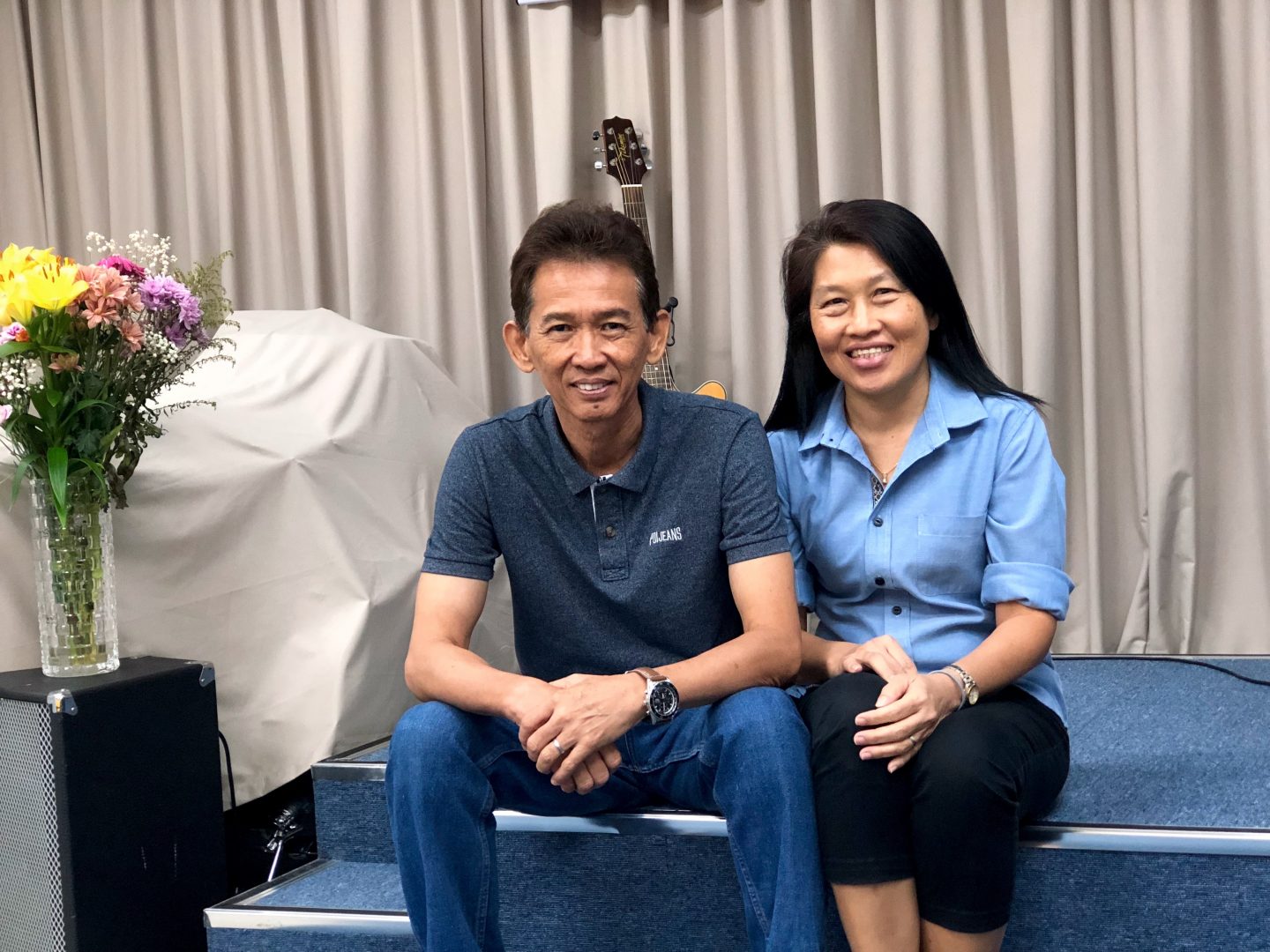
When Pastor Caleb and his wife Susan first started their Chinatown church in 2006, he knocked on every door in 18 blocks of flats in the neighbourhood to invite residents to come. There was faeces, pee and vomit in the deserted corridors. All photos by Juleen Shaw.
If not for two mentally ill people, Pastor Caleb How’s church in Chinatown would not have existed.
An old church mate of Pastor Caleb’s who was warded in the Institute of Mental Health (IMH) had a request for the pastor: “Please ask my flatmate, Zed*, to come and visit me.”
The kind pastor agreed, and invited Zed, himself suffering from depression, for lunch. Touched, Zed asked the pastor: “Would you like to come and visit me?”
Pastor Caleb looked up the address: York Hill. It was in a part of Chinatown he had never known existed.
When he knocked on the door of Zed’s one-room rental flat in the midst of a long, dark corridor, Zed had a surprise for the pastor.
Opening the door wide, he beckoned Pastor Caleb into his bare home, no larger than a single room, where five other people were seated on Zed’s bed (a dirty, bed-bug infested mattress with no bed frame).
He had barely left the flat when he heard God say: “Caleb, this is your church.”
One had HIV, the others were drug addicts.
Zed, a Christian, told Ps Caleb: “I invited my friends to come and hear you preach.”
“Wow I wish I had known in advance! I didn’t even bring a Bible. Can I borrow yours?” asked the flustered pastor.
He shook their hands and shared a short passage from Scripture, whereupon Zed asked: “Pastor, can you pray for them?”
“I will never forget that moment,” Ps Caleb says, his eyes still misty as he remembers the scene that took place 14 years ago.
Spontaneously, the five eagerly got down on their knees to receive prayer, their eyes squeezed shut, their faces turned upwards in expectation.
Their posture of deep humility and their open hunger for God had the pastor choking back tears.
After the prayer, he had barely left the flat when he heard God say: “Caleb, this is your church.”
And Pastor Caleb, who had recently registered a church and had been praying for months to discern the right location, knew that he was meant to set up His Glorious Church in the impoverished Chin Swee neighbourhood.
Kampung evangelism
Caleb How, now 62, was raised in a kampung in Coronation Road in the 1960s, where his family ran an orchid business.
“We had a simple life, cooking over a charcoal fire, catching spiders and playing marbles,” he says.
He wasn’t a good student, he confesses, getting “a lot of red marks” in secondary school. Fearing that he would not get promoted, he opted to transfer to the Vocational and Industrial Training Board (VITB), now known as the Institute of Technical Education (ITE), from which he graduated with a welding trade certificate.
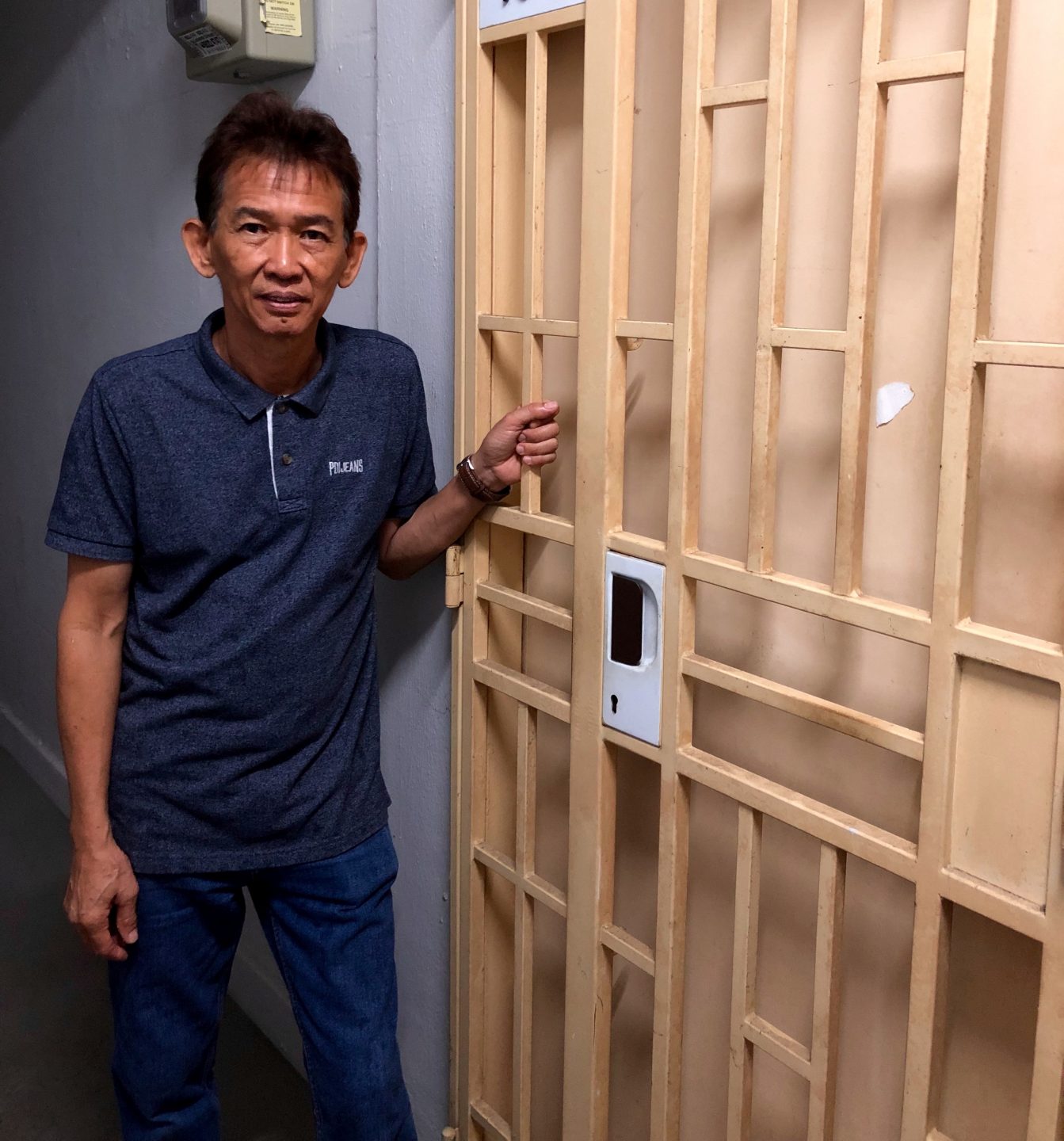
Pastor Caleb’s visit to Zed, whose home is seen here, was the catalyst for His Glorious Church to be set up in the Jalan Kukoh/Chin Swee area.
Little did he know that his welding skills would later put him on the path towards finding God.
Home alone one day, when he was 15, the doorbell rang and Caleb opened the door to a couple from a Bible Presbyterian Church nearby. They said: “We are here to tell you about Jesus” and introduced Caleb to the four spiritual laws.
At the end, the couple showed Caleb a piece of paper with two circles: The circle on the left was marked Self Centred Life and the other was marked Christ Controlled Life.
“When they asked which I would choose, I immediately pointed to the right circle, and they said the Salvation Prayer with me,” remembers Caleb.
Although he had intended to start attending church, his father was livid upon hearing the news and made him kneel in front of ancestral idols. He was too scared to attend church after that, “but deep in my heart, I knew I was a Christian”.
5am with God
During National Service, Caleb heard a Navy recruitment talk: Join the Navy and see the world!
“Since I had no job, I said to the naval officer, ‘I only have PSLE qualifications and a welding certificate. Will I be accepted?’
“He said, ‘Why not? All our ships are metal!’”
“It became so that we needed to wake up at 5am to spend time with God.”
So Caleb signed on as a naval ship wright.
“In the Navy, a fellow regular asked if I was a Christian. I said ‘Yes I am’ because I had never forgotten that encounter at home. He made me repeat the salvation prayer just to be sure! Then he gathered a few more Christians and personally discipled us for six years in the Navy.”
The discipline was rigorous. Every morning at 5am sharp, there would be a knock on his door and the group would begin devotions. Scripture memory was compulsory; Bible study followed.
“We were serious about our faith,” says Caleb. “It became so that we needed to wake up at 5am to spend time with God.”
Back to school
It was during a church mission trip to India that Caleb was moved to serve the needy.
“I witnessed a scene between a young mother and her child. The distressed mother was using a wooden pencil case to hit the hand of the child, who was clinging on to her. Perhaps the mother had to sell or leave the child, I don’t know. But she hit the child so hard that the wood broke into pieces, yet the child just kept rubbing her hand and refusing to let go.
“I broke the rule about not giving money to people on the streets – I ran across the road, passed them some rupee, then crossed back. When I turned around, they were gone.
“But I could not get the scene out of my mind. Even when the others went out for dinner, I stayed in bed crying. It was the first time the Lord put such a deep compassion on my heart. From that day, I knew that I wanted to give my life to the Lord and commit myself to mission work.”
To prepare himself, he enrolled in the Bethany School of Missions. But Bible school proved to be no walk in the park.
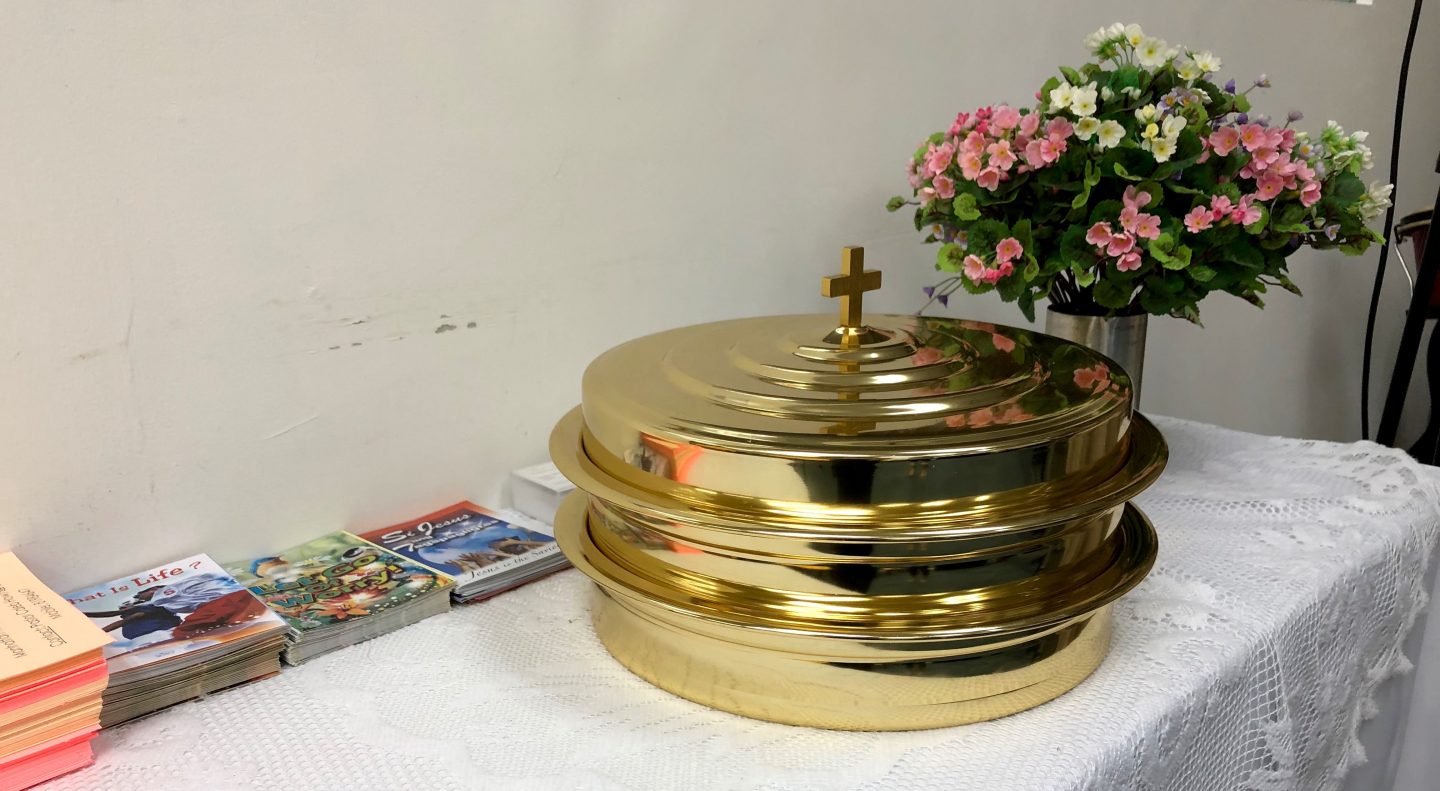
This communion tray was bought by the Hows in faith, before they even knew where their church would be located.
“The other students were in their 20s; I was almost 40 when I enrolled,” he says.
By then he was married to Susan, the sweet-natured daughter of a rival orchid nursery owner, and was the father of two sons, Josiah and Isaiah who were one and three.
“There were 20 lessons in a year and every two weeks we would have an exam. There were book reviews and practicums. After two weeks, I broke down. I can’t study – I only have Primary 6 qualifications! During chapel, when the others were worshipping and the lecturer was sharing, I was crying.
“They stopped the service and everyone came to me saying, ‘What’s going on, Caleb?’ It was so embarrassing. I told them it was too tough for me. They ministered to me and prayed for me, and the Lord gave me 2 Corinthians 12:9: My grace is sufficient for you, my power is made perfect in your weakness.
“After that, it was like my mind was a photocopy machine! When I saw the exam paper, I said, ‘All this I know!’ and I started to write and write. I passed with amazing marks.
“God taught me that if you just hang on to His promises, nothing is impossible.”
Bus Sekolah
After graduation from Bible school, Caleb, his wife Susan, and their two young boys were sent to Permas Jaya in Johor Bahru to pastor a young church for two years.
Apart from the townspeople who came to church, Caleb, now a pastor, wanted to minister to the Indian rubber tappers in the nearby kampung.
Susan had just suffered a miscarriage, so while she rested, Ps Caleb took their two sons, aged four and five, along to recce the village.
“We had two bicycles and we would cycle, with our sons riding pillion, to tell the villagers about Jesus.”
They met two village boys and Ps Caleb said to them: “There’s a church outside the village. Would you like to join us? Wait here on Sunday evening and I will come and fetch you.”
“The first Sunday, our church was already packed like sardines. We had a service, and later on started Sunday school and English and Math tuition sessions – one hour tuition, one hour of Bible stories. We showed a Jesus film in Tamil.
“Eventually we had to rent a yellow bus sekolah driven by a volunteer to ferry all the villagers to church from the kampung!
“We bonded with the Indian villagers and ate many meals with them. They were very authentic people. We had two mountain bikes and Susan and I would cycle, with our sons riding pillion, to the village to tell the villagers about Jesus.”
The rapport was so strong, in fact, that when one of the young women in the village delivered a stillborn baby, the family called Ps Caleb and said: “Uncle, we have no means to take the baby to the cemetery to be buried. Will you help us?”
And he did. After that, their bond with the villagers was even stronger.
Spiritually bankrupt
The Hows returned to Singapore in 1995 when their eldest son was about to go to Primary 1, and their third son, Zechariah, was born.
“I must say, when I returned from JB, I harboured pride that I was a missions pastor. I joined my church expecting to be recognised and given a ministry to serve. I was spiritually bankrupt,” confesses Ps Caleb.
“The pastor said, ‘We have no ministry for you. If you want to serve, Caleb, start with ushering.’
“The Lord was breaking my spiritual pride to prepare me for ministries that He would entrust me with later.”
“Ushering! Hey I’m a missions pastor! I thought. And so I refused to serve.
“At the church camp, God spoke to me and I was humbled. When I returned, I immediately signed up as an usher. It felt like starting from ground zero.
“The Lord was breaking my spiritual pride to prepare me for ministries that He would entrust me with later. Now I know that you put your best people in hospitality because the ushers are key to a warm church.
“Slowly, He allowed me to go from ushering to assistant cell leader, to Board member, then assistant pastor.”
Today, Ps Caleb says he is transparent with his congregation about the challenges he faces. “They need to know that their pastor is still human. We have challenges too and we don’t look down on them for having problems, because we understand.”
Their children’s hongbaos
When God called the Hows to start a new church, they reacted with trepidation.
As Ps Caleb was reading 2 Chronicles 36, when the Lord said: I commanded you to build me a temple in Jerusalem, he felt the Lord impress upon him that it was time.
He called Susan and said: “Dear, I think God is asking us to start a new work.”
“Her reaction was: Huh. At the time, we had house bills, children’s education bills, insurance bills, and the Lord wanted us to start a new work with zero support.
“During the first year, woah, it was so tough,” Susan, now 57, recalls. “We not only ate into our savings but into our children’s savings – their hongbao (red packet) savings.”
Ps Caleb asked God: “Who are the people you are giving to us to minister?” And the reply was 1 Samuel 22:2 – those in distress, those in debt, those who are discontented in life will come to you.
“We not only ate into our savings but into our children’s savings – their hongbao savings.”
“I told the Lord: I need a name! And the Lord said: Call it His Glorious Church,” says Ps Caleb. “We said, woah, cannot, Lord, that name is so power! We are just a small church! But the name God gave us is found in Ephesians: God will present to himself a glorious church.”
They registered His Glorious Church, and the Bible House offered them temporary premises.
Knowing they needed a more permanent place, the Hows prayed every day for a breakthrough. For six to seven months, they cycled to East Coast Park every day with their two-year-old daughter in tow to pray while she played in the sand.
Where were they to go? Where was their catchment? Who were the people they were to reach out to?
This all became clear when Ps Caleb visited Zed. The rest is history. A 14-year history, come January 1, 2020.
“Gift of the nose”
When Ps Caleb set up His Glorious Church in a small but clean space in Manhattan House in the Chin Swee area in 2006, he and his cousin knocked on every door in the 18 blocks of flats in the area to hand out flyers.
Zed told him: “Pastor, do you know the poorest of the poor live around here?”
In those days, there was faeces in the HDB corridors, pee on the staircase and puddles of vomit to navigate.
“When you knocked on my door, I was very surprised. Nobody knocks. Because nobody visits.”
“You had to have the ‘gift of the nose’ when you came to Jalan Kukoh,” says Ps Caleb, “to withstand the strong smells, even from the unventilated flats when residents opened their door.”
Once when a man opened his door, he said: “Do you know this is a forsaken place? When you knocked on my door, I was very surprised. Nobody knocks. Because nobody visits.”
The poverty and dejection hit Ps Caleb hard.
And he determined, more than ever, to serve this “forsaken” community made up of drug addicts, ex-offenders, and the mentally ill abandoned by their families.
In the beginning, having come from an established Assembly of God church, Ps Caleb went to church in long sleeves, tie, and tailor-made pants, with a name tag.
But when their congregation arrived, they were in shorts and slippers and occasionally shirtless.
“We removed our tie, then our name tag and swapped out our pants for jeans in order to be one of them,” says Ps Caleb.
“They were not concerned with appearances. They came in needing to be encouraged and comforted, hungry for love and acceptance.”
Baygon by the carton
Having served in Prison Fellowship (PFS) since 2005, Ps Caleb had learnt worship songs in Hokkien and Mandarin. His sermons were a hodgepodge of Hainanese, Hokkien, Cantonese, Mandarin and Bahasa.
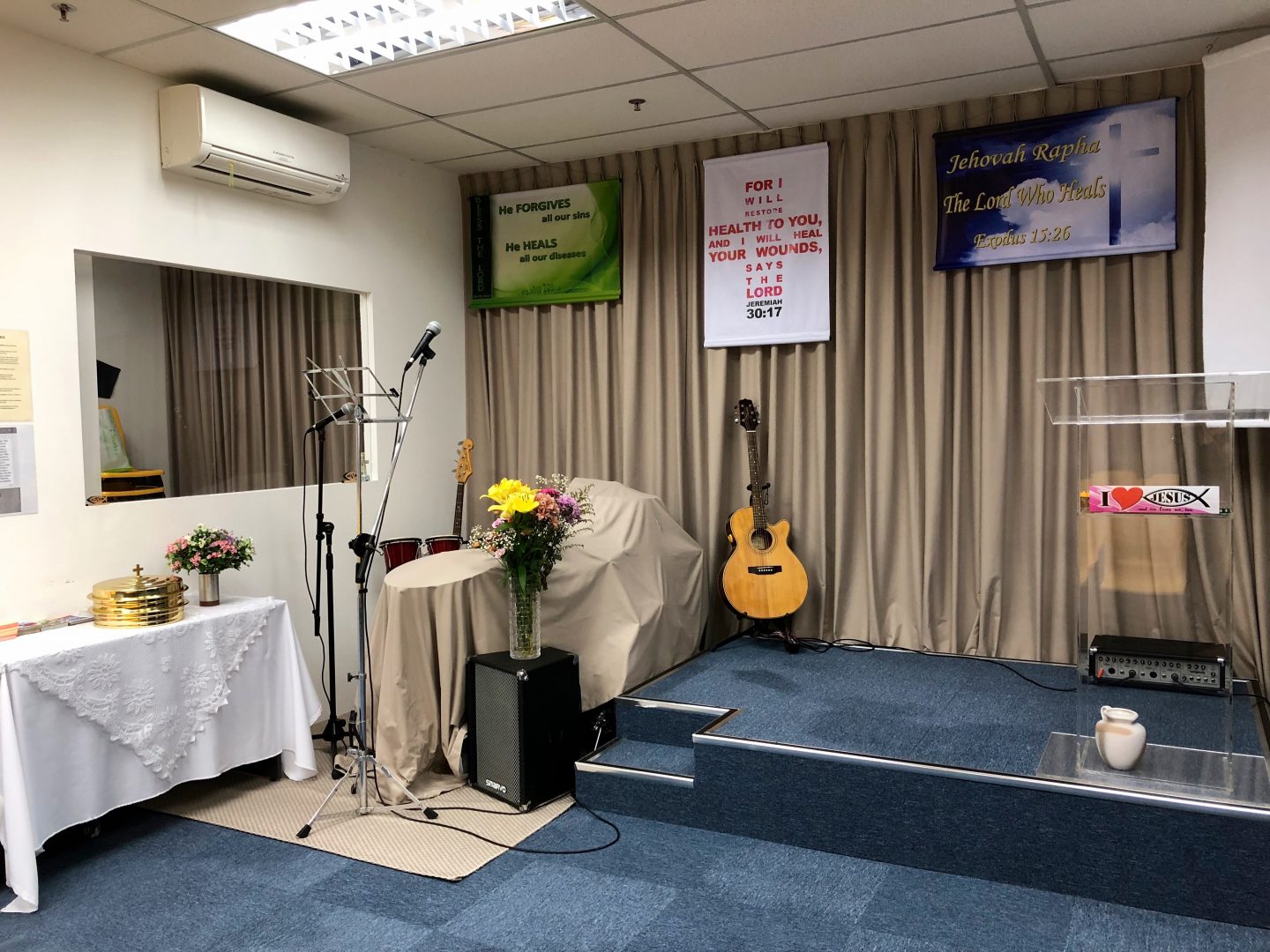
The one-room church in Manhattan House is tidy, bright and welcoming, with the enclosed area (left) used for healing and deliverance.
He made sure his leaders were called by the Lord because “there is no glory here. Attendance is low, the people are transient”.
“In some churches, you speak to the thousands; here, you speak to the 10s and 20s.”
The challenges were real: In a home cell group once, there was an altercation between the members and punches flew. One went to the kitchen and picked up a knife to stab the other; Ps Caleb had to step between them.
An HIV patient who had injured himself from a fall came to cell group bleeding all over the floor. Ps Caleb and Susan immediately stopped the proceedings, put on plastic gloves, dressed the patient’s wounds and cleaned up the house before carrying on with cell group.
One went to the kitchen and picked up a knife to stab the other; Ps Caleb had to step between them.
“During a prayer meeting once, a stranger came to the door – we always left the door open for visitors – and he said, ‘Excuse me, I am looking for Kumar*, is he here?’” remembers Ps Caleb. “I could not lie and I said, ‘Yes.’ When Kumar heard that, he ran to the toilet. Next thing we knew, the place was swarming with narcotics officers who arrested him.
Another time, during Bible study, a man went into the bathroom, and shortly afterwards, another man followed. They were in the toilet for a long time and when Ps Caleb knocked on the door, they threatened him angrily. The next day, when the host was cleaning the house, she found syringes under the washing machine. They had been shooting drugs.
“We have had all kinds of drama,” says Ps Caleb with a chuckle. “There was a man who was high on drugs and alcohol and during service, he came up and touched the guitars. Even after I told him service had started already, he persisted. And I had to tell him to leave. He was so angry, he punched the glass panel, urinated in the corridor and kicked the dustbin. Then he came back and apologised.
“Another man came to church shirtless and started talking during service. After awhile I had to stop, and literally drag him out. Less than two minutes later, he opened the door and I thought, ‘Jialat, what is he going to do.’ He walked to me, kissed my foot and walked out.”
While fellowship was warm at cell group in members’ homes, bed bugs were a problem. After cell group, the couple would routinely put their clothing, shoes and bag into a pail and cover them with hot water. Baygon was used liberally to fumigate curtains, sofas and chairs.
“We used to joke that the shares of Baygon went up because we bought so much!”
An offering of 20c
But the rewards were priceless.
An 80-year-old woman with a swollen leg came in for healing and after Ps Caleb and his healing team prayed over her, she was healed. A man with speech problems and pain in the leg from a stroke was prayed for an healed.
One uncle gave 20c and 50c coins in a Ziploc bag. Some give NTUC vouchers that they had received from the government.
An old man with arthritis asked for prayer. When Ps Caleb asked if he believed in Jesus the man replied: “Not until He cures me of my arthritis!” “We said in Mandarin: Mei wen ti (no problem) and prayed. I told him, ‘Uncle, when you are healed, please come back next week to give thanks to the Lord!’ The next week he returned saying he was healed.
The church leaders saw many such miracles.
“That’s one of the ways people encounter God. He is a God of miracles,” says Ps Caleb.
The poor come to church and sometimes put in the offering bag $30 of coins that they had been saving up. One uncle gave 20c and 50c coins in a Ziploc bag. Some give NTUC vouchers that they had received from the government.
“We never belittle anyone who gives even a 20c coin. Because that is their widow’s mite.”
God’s blueprint
Today His Glorious Church is an oasis of peace and calm, fellowship, food and warmth. The cosy and clean space sports paintings, banners and musical instruments donated by well wishers and Ps Caleb’s previous JB church.
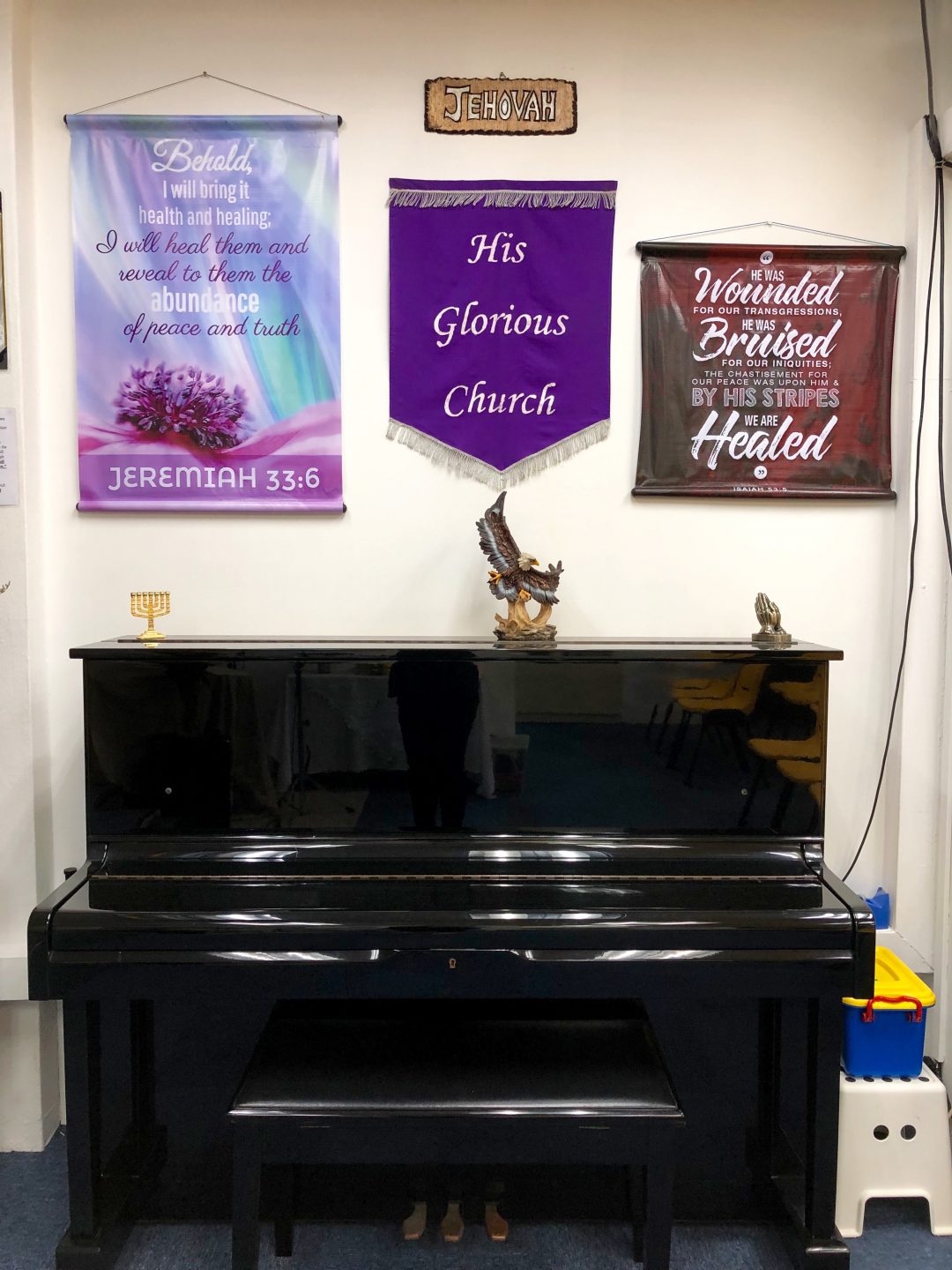
The Hows were hands-on in setting up the church, getting banners and posters printed at low cost. In the beginning, Susan cooked beehoon and fried rice for church goers. Flowers and artwork were donated by well wishers.
A Jalan Kukoh cell group, Ang Mo Kio cell group, Wednesday night food distribution, Thursday prayer and revival meetings and Saturday worship and healing services serve the needs of the neighbourhood.
During a Prison Fellowship meeting with an inmate, Ps Caleb mused: “I really don’t know why God chose me to come to Chinatown to minister to drug addicts when I don’t have any experience in this.”
The inmate replied: “You know why, pastor? It’s because you’re not a drug addict. If you were, the temptation to take drugs would be too strong.”
“I thought that was brilliant!” says Ps Caleb.
Every now and then, he is unexpectedly moved by his small flock.
When their friend dies, there are no tears, they get on with life because they are used to grief.
Once a few homeless people were at Riverside near his church late at night, seated on the filthy ground. Ps Caleb approached as he saw someone he knew, and he asked the group: “Can I join you?” One of them immediately said: “No, no. You cannot sit down.” And he left. After awhile he returned with some cardboard. “Pastor,” he said. “We can sit on the floor. You cannot.” And he gave me the cardboard.
“Do you know how privileged I felt?” says Ps Caleb with emotion. “These people may be homeless, but they really respect their spiritual leaders.
“They can see your heart because they have been hurt and rejected and put aside before. They know if you’re the real deal or not. When their friend dies, there are no tears, they get on with life because they are used to grief.”
His church is a place where the broken can come to “rest, recuperate and heal their broken wings so they can rise again”, says Ps Caleb.
A verse that he holds dear is Acts 20:24, where Paul is surrounded by trials and tribulation but he says none of these move me, neither do I count my life dear unto myself, but that I may finish my race with joy.
“We are here to do what is according to God’s heart and mind. We cannot take the blueprint of another church and use it here. We pray for our own blueprint.”
*Names have been changed to protect the privacy of the individuals.
For more information or to support His Glorious Church, please click here.
Ps Andrew Khoo, founder of S’pore’s first homeless shelter, has given refuge to over 900
I was a failure but a family gave me a home; today I’m the National Director of YWAM Singapore
We are an independent, non-profit organisation that relies on the generosity of our readers, such as yourself, to continue serving the kingdom. Every dollar donated goes directly back into our editorial coverage.
Would you consider partnering with us in our kingdom work by supporting us financially, either as a one-off donation, or a recurring pledge?
Support Salt&Light
